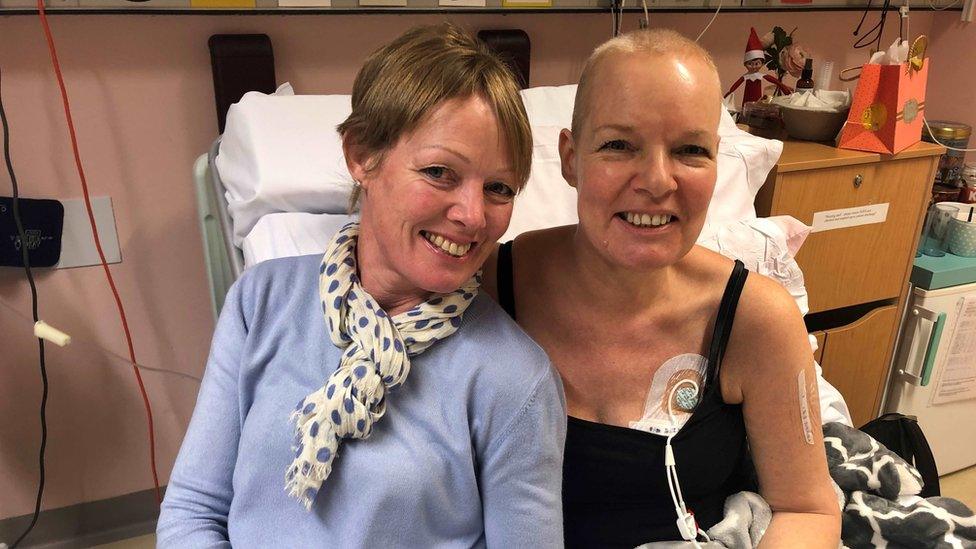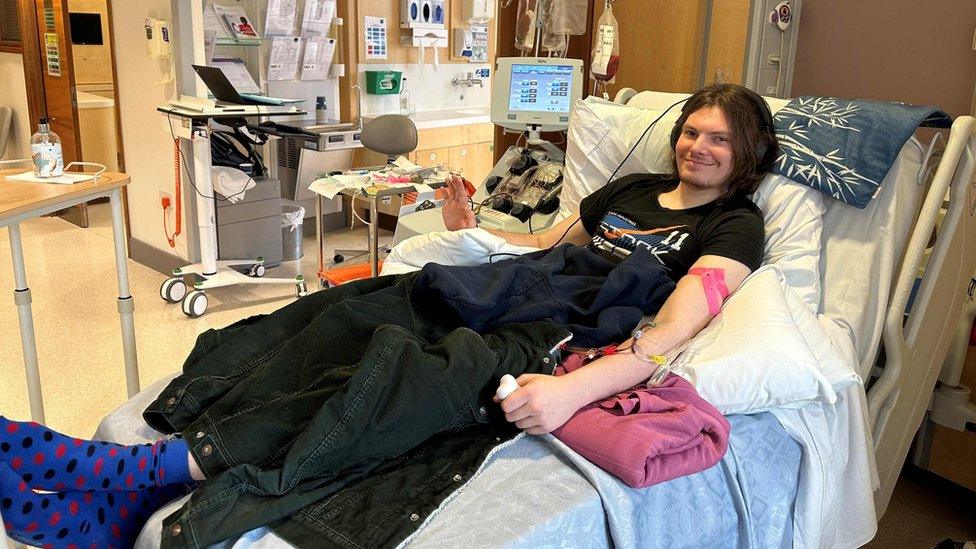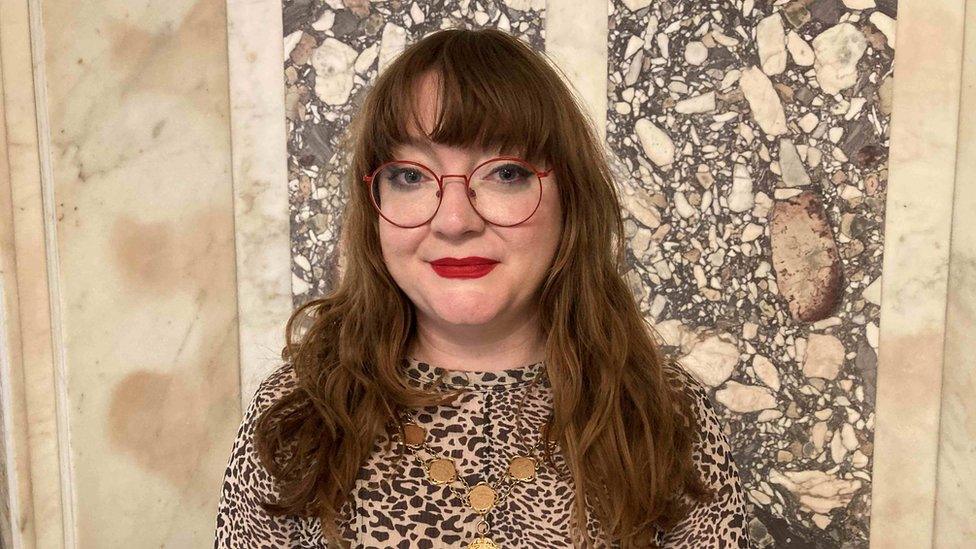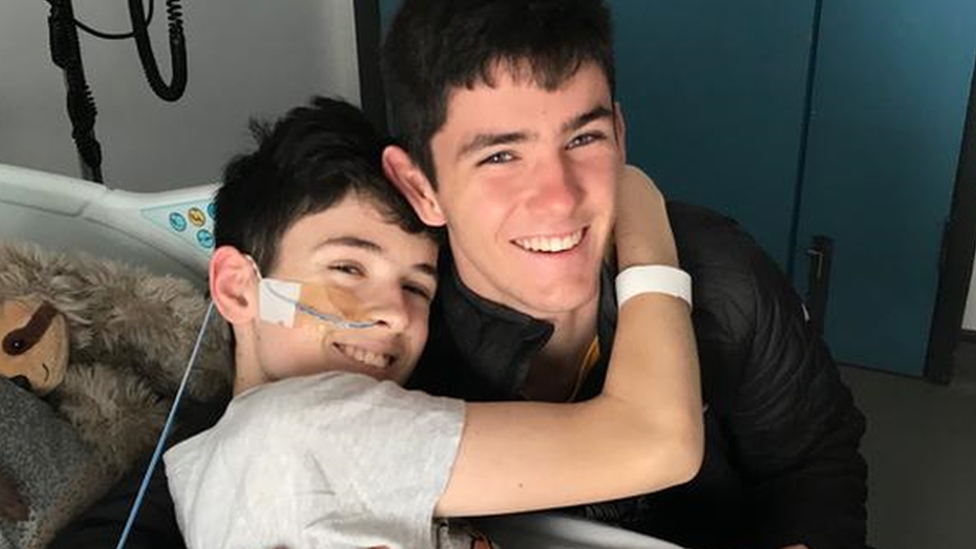Sister's stem cells help woman fight leukaemia
- Published

Lesley Calder got 'lucky' when her sister Annie was a suitable stem cell donor
A stem cell transplant from her sister gave Lesley Calder her life back after receiving a "devastating" cancer diagnosis.
Doctors told the Omagh woman in 2019 that she had acute myeloid leukaemia. , external
When chemotherapy was unsuccessful, her only option was a stem cell transplant and her three siblings came forward to be tested as stem cell donors.
The chances of a sibling match are just 25% but Lesley was "lucky", with two full matches and one half match.
After tests, her sister Annie was chosen.
"I've got my life back," said Lesley
"I've been able to get back and do everything I want to do.
"My husband took early retirement a month before I was diagnosed. We were just about to do all the stuff you plan to do when you retire and that all got taken away.
"We've been able to start doing those things that we planned," she said.
Finding a match
The 58-year-old said she was always close with her sister, but this has given them an extra bond which they celebrate every year.
After her experience, Lesley's son Max decided to join a stem cell register after learning that, unlike his mum, most people do not find a match in their own family.
He was called on to donate his stem cells to a stranger last summer.
Lesley said this was emotional for the family, and it felt like everything had come full circle.
"I know personally what that means and as a family we know what that means.
"Max has said that he felt he was paying it forward."
Every 20 minutes, someone in the UK is diagnosed with blood cancer.

Lesley's son Max was called on to donate stem cells last summer
For some of those patients, a stem cell transplant will be the only way that they can recover.
Seventy per cent of patients will not find a stem cell match in their family.
Currently only 3% of the UK population is signed up to the stem cell donor register, and four out of 10 UK patients looking for an unrelated donor are unable to find a match.
Fewer than 6% of people in Northern Ireland are registered as stem cell donors according DKMS, a blood cancer charity.
Anyone aged between 17 and 55 years old and in general good health can join the register - all it requires is a simple cheek swab.
'Positive' experience of being a donor
Seán Brady from Newry signed up to become a stem cell donor through another charity, Anthony Nolan, which he said was an "easy decision" for him.
"I just wanted to try and help someone. There's so many people whose lives have been impacted and suffered loss and heartbreak at the hands of cancer," he added.
Stem cell donors: 'It's a small sacrifice in the bigger picture'
"Blood cancer and leukaemia unlike some other cancers can be treatable."
Twelve years after registering, Seán got a phone call to say that he was a potential match for a patient who had blood cancer.
"You don't know anything about the patient.
"You're just told that they essentially need your help, and your stem cells can be one of the last avenues that they can try to help in their fight."
Seán's experience of being a donor was "so positive".
"It wasn't painful, it was uncomfortable, but in no way painful."
'A devastating blow for the entire family'
He said he will remain on the register up until he is 61 so "there is always a chance that I could be a match for another person in need".
"I'm in no way special," he said.
"My stem cells are in no way special but they were special for that one person who needed them to try and help fight this horrible disease."
Increasing the number of people on the donor register means a greater chance of the 2,000 people each year who require stem cells finding a match.
This weekend there are donor drives in Belfast.

Blood cancer has hit Deputy Lord Mayor of Belfast Áine Groogan's family more than once
For the Deputy Lord Mayor of Belfast, Áine Groogan, blood cancer has affected her family.
She lost her uncle to leukaemia when she was 14.
"It was a devastating blow for the entire family," she said.
She also has a cousin who was diagnosed with "two forms of leukaemia just as lockdown was happening" but is "delighted to say that thanks to stem cells and other treatments she is cancer free and is absolutely doing amazing and incredible".
She has been working with charities that fight against blood cancer and blood disorders and has been behind a donor drive at Belfast City Hall.
She said she knows "blood cancer can be devastating to families, but there's hope".
"One thing that we all can do in our fight to delete blood cancer, is to get on the blood stem cell donor register," she said.
- Published28 February 2024
- Published30 June 2022
